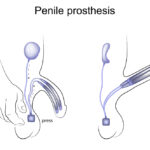Talking to a Partner About Peyronie’s Disease
Sex can be a sensitive topic for any couple. Some people are shy about their bodies or feel embarrassed discussing a subject so private and personal. But there are times when sexual issues need attention, and Peyronie’s disease can be one of those times.

Peyronie’s disease can make intercourse difficult—and sometimes impossible. Plaques (scar tissue) form just beneath the skin of the penis, which becomes less flexible. As a result, the penis starts to bend. The extent of the curvature varies, but it can be as high as 90 degrees.
If there are lots of plaques, the penis might take on an hourglass shape. It could also narrow at the tip (a “bottleneck” deformity) or at the base (a “cobra head” deformity). For some men, there is a “hinge” effect that could make the penis unstable during an erection
Peyronie’s disease can be painful, too. And some men develop erectile dysfunction. They may have sex less often or stop having sex altogether.
There’s an emotional component to Peyronie’s disease as well. Men may feel ashamed of the way their penis looks, have doubts about their masculinity, and worry that their partner will think they’re less attractive. They may also feel anxious about their partner’s sexual satisfaction and fear changes in the relationship. Depression is common, as many men miss the robust sex life they once enjoyed.
And Peyronie’s disease impacts partners. They often notice that the relationship has changed and miss what used to be. If the man with Peyronie’s withdraws, partners may feel isolated or neglected.
Fortunately, like many sexual problems, Peyronie’s disease can be treated in several ways. The process starts with a conversation. And good communication between partners can make treatment more successful.
Broaching the subject
Couples might start the conversation when they’re alone and feeling relaxed.
Here are some sample openings:
There’s something that’s been on my mind lately—something sexual—and I was hoping we could talk about it.
- I really enjoy our intimate times together, but there’s something troubling me. Can we talk?
- It’s okay to admit to feeling nervous or awkward. Often, the subject has been on the partner’s mind, too, but they haven’t been sure how to approach it. Starting the dialogue might bring a sense of relief.
Opening up
Peyronie’s disease comes with a range of emotions, and it’s good to get those out in a constructive way. Frustration, depression, fear, anxiety—they’re all valid. When such feelings are out in the open, couples gain some perspective. They can listen to each other, reassure each other, and approach the future together, as a team.
Keeping the conversation going
Talking about Peyronie’s disease doesn’t need to be a “one and done” conversation. Over time, and as treatment progresses, feelings and perceptions might change. Checking in with each other from time to time can enhance the overall dialogue.
Learning together
Peyronie’s disease isn’t a term people hear every day. For some, it might be brand new. Researching the topic together is another way to keep the conversation going. Some couples share what they discover online, on television, or in magazines. They might also attend doctor’s appointments together and ask questions.
Exploring together
Peyronie’s disease doesn’t have to stop a couple from being intimate, and sex is more than intercourse. Couples can focus on what is possible and enjoyable. This part of the conversation can be creative and fun.
Staying supportive

Encouragement is important for couples facing Peyronie’s disease, and each partner can be a cheering section of sorts. For example, after a man finishes a round of
treatment, a partner might say, “That couldn’t have been easy. I’m proud of you!” Or if a man has trouble keeping an erection during a sexual encounter, the partner might say, “That’s okay. I love what we do together.”
Considering counseling
Even when they have the best of intentions, couples may still struggle with communication. This is when a couples counselor might help. A trained therapist can teach strategies for expressing thoughts clearly, listening respectfully, and responding constructively. Urologists can make referrals for therapy.
For single men
For single men with Peyronie’s disease, starting new sexual relationships can be especially daunting. If they are still getting to know a new partner, they may be unsure of what to disclose and when.
Much of the advice above can apply to single relationships. Building trust takes time, but couples just starting out can still have similar conversations about Peyronie’s disease and its effects on intimacy.
A man might say, “Before we take the relationship further, there’s something I want to talk to you about.” If the relationship has been supportive and based on trust up to this point, chances are the partner will respond positively and be open to discussing other options for intimacy while the man seeks treatment.
Wrapping up
Sometimes the hardest part of having a sexual discussion is starting it. But all it takes is a deep breath. It may not be perfect or go exactly as planned, but starting the conversation is usually better than not having it at all.
Resources
Association of Peyronie’s Disease Advocates
“Impact on Relationships”
https://www.peyroniesassociation.org/living-with-peyronies/impact-on-relationships/
“Talking to Your Partner”
http://www.peyroniesassociation.org/living-with-peyronies/talking-to-your-partner/
“Psychological Impact of Peyronie’s disease”
Video available at: https://www.peyroniesassociation.org/living-with-peyronies/impact-on-relationships/
Saga.co.uk
Green, Siski
“Living with Peyronie’s disease: the impact on sex and relationships”
(Updated: March 17, 2021)
https://www.saga.co.uk/magazine/relationships/love-sex/living-with-peyronies-disease-impact-on-sex-relationships
Sexual Medicine Reviews
Kern, T., et al.
“Peyronie’s Disease: What About the Female Sexual Partner?”
(Abstract. Published: December 17, 2020)
https://www.smr.jsexmed.org/article/S2050-0521(20)30117-7/fulltext
Translational Andrology and Urology
Terrier, Jean E. and Christian J. Nelson
“Psychological aspects of Peyronie’s disease”
(Full text. June 2016)
https://tau.amegroups.com/article/view/10542/11177

